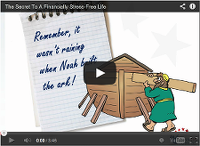A comment last week by Federal Reserve Chair Janet Yellen (read Is Pamela Yellen Related to Janet Yellen?) sent my inquiring mind down an investigative rabbit hole. (Update: Janet Yellen was replaced by Jerome Powell in January, 2018.)
Janet stated that the Great Recession showed that a large number of American families are “extraordinarily vulnerable” to financial setbacks because they have few financial assets to fall back on when the you-know-what hits the fan.
She cited a new study showing that an unexpected expense of just $400 would force the majority of American families to borrow money or to have to sell something to cover it.
Just $400! Yikes! What is that? A minor car or appliance repair or a small medical or dental expense?
That stat came from a survey released by the Federal Reserve this summer that was so ignored by the media that it even escaped my notice.
When I finally tracked down that Federal Reserve survey (Report on the Economic Well-Being of U.S. Households in 2013), I could see why the media wanted to keep it under wraps.
Here are a few startling revelations from this Report…
- Among those who had savings prior to 2008, 57% used up some or all of their savings in the Great Recession and its aftermath
- 34% reported going without needed medical care in the last year because they couldn’t afford it
- 42% had to delay a major purchase or expense directly due to the recession, and 18% were forced to put off a “major life decision”
- 24% experienced a major unexpected medical expense they had to cover out of their own pocket in the prior 12 months (yup – that’s one out of four of us)
- One-third of those who applied for credit were turned down or given less credit than they applied for
- Just over half were saving some portion of their income, but about one-fifth were spending more than they earned
Another shocking report released last month revealed that in spite of the jump in value of stocks and real estate, the combined 401(k) and IRA balances for households nearing retirement actually declined to only $111,000 in 2013. (It was $120,000 in 2010.) That data comes from another Federal Reserve report – the 2013 Survey of Consumer Finances.
How much income do you think that $111,000 would provide you in retirement??
Are you sitting down? If a couple purchases a joint annuity with that $111,000, they would receive only… $500 per month!
And since the survey showed the typical household has virtually no financial assets outside of their 401(k)’s and IRA’s, that $500 a month is likely to be their only source of income to supplement their Social Security (and who knows how much of that any of us are actually going to receive?).
To top it all off, this week the Federal Reserve revealed that consumer debt in America just hit an all-time high!
This sad state of affairs can be totally avoided when people embrace two simple, but powerful, concepts:
Watch this video to discover the secret to a financially stress-free life.
Is your Financial Plan a House of Cards?
Is your financial plan a house of cards that could come tumbling down with the next financial emergency or market crash? Do you want to enjoy a financially stress-free life that lets you handle whatever curve balls life throws at you?
If so, take a look at how The Bank On Yourself safe wealth-building method can give you lifetime financial peace of mind and put an end to worry and sleepless nights.
Request your Free Analysis right now (if you haven’t already). It’s easy to do, and there isn’t any obligation.
REQUEST YOURFREE ANALYSIS!




Speak Your Mind